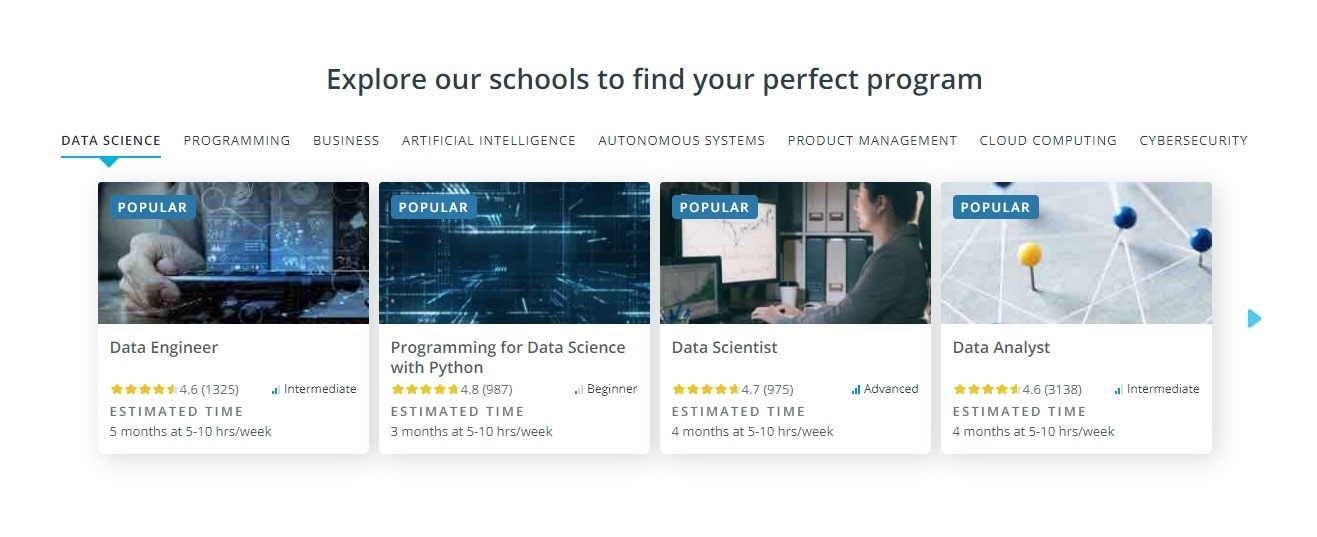Udacity is one of the most renowned platforms among the platforms that offer online courses , especially courses known as MOOC (Massive Open Online Course).
The company Udacity was founded by Sebastian Thrun, David Stavens, and Mike Sokolsky in 2011, and its creation is the result of an innovative experiment carried out by Stanford University, in which Sebastian Thrun and Peter Norvig developed the online course “ Introduction to Artificial Intelligence” so that it could be offered to anyone, free of charge. Since its foundation until today, the platform has been seeking to develop online courses that contribute to the training of competent professionals in the areas of technology and computer science.
However, as every teaching platform has its specificities, Udacity has some specific characteristics that make it the ideal platform for a very specific audience. Below, we present the main features of Udacity for you to assess if this is the right platform for you.
How Udacity works

Udacity works as an online learning platform, specializing in open courses and nanodegree courses. His courses are more focused on the following areas:
- Technology
- Computer science
- TI
- data science
Regardless of the area of expertise you are seeking to improve, in order for you to effectively undertake training in any technical and vocational course at Udacity, you need to be registered on the platform and purchase the course of interest. Even free courses require prior registration before you can access their content.
Courses are purchased individually, and you need to be registered on the platform to access the content. In addition, you must meet the course requirements to receive your certification. Requirements include a cut-off grade in a final assessment and, with regard to nanodegree courses, passing the practical projects that the course offers so that you can gain an in-depth knowledge of the skills that the job market requires.
Udacity is accredited
Udacity is accredited, but falls under the for-profit category. Its courses are classified as open courses, as Udacity is not an academically trained higher education institution. Its courses are more focused on professional training at a technical level.
In addition, Udacity also offers more complete training for those who already work in the market and already have an advanced level of knowledge through so-called nanodegree courses. These courses feature longer duration, more complete theoretical content and practical activities where the student performs projects (sometimes even real projects) through partnerships that Udacity has with other technology and computer science companies. These courses are a little closer to a conventional academic training, both for their syllabus and duration and for the relevance that such certifications represent for the student’s professional curriculum.
>>> CLICK HERE and check out all courses
Udacity prices
Udacity has different prices, and these vary by course type, duration and category. Furthermore, knowing whether the course is predominantly theoretical or has practical aspects also makes all the difference. Nanodegree courses cost an average of US$400 per month. On the other hand, open courses usually vary between US$ 29.00 and US$ 59.00, and there may also be courses with different values, depending on the level of specialty and duration.
Udacity has Free Courses

Many of the courses offered by the Udacity platform are MOOC courses, that is, open courses with free access. However, if you choose one of Udacity’s free courses, it is important to know that this modality does not give you access to a certificate of completion. You can even take the course for free and only then decide whether or not to apply for certification, but you will need to pay for the issuance of the certificate if you wish.
Udacity has a certificate
Every course offered by Udacity offers a certificate option for the student who meets its requirements. However, the certificate has some rules, such as:
- The student must have completed the entire course within the stipulated deadline.
- Upon completion of the course, the student must obtain a cut-off grade in a final assessment.
- In some cases, the student must also have had practical experience running projects, and have performed within the expected range of the course in question.
- Pay the certification fee, when applicable (monthly courses usually do not charge additional fees for issuing the certificate)
Once you fulfill all of these requirements, any course you take through the Udacity platform will give you access to a certificate and you will be able to present it at any job interview in your area of interest. As it is an accredited company, the Udacity certificate has value in the academic and professional markets. And many of the courses on the platform are a real differential for the insertion of the candidate for a job vacancy.
Who is Udacity for

Udacity is the ideal platform for all professionals in the fields of technology and computer science, as well as for you who are not yet a professional in the field but are interested in working in these areas. That’s because Udacity has courses at different levels of specialization, serving from the beginner who needs to learn basic and introductory notions, to the advanced student who already has advanced knowledge and wants to stand out in the job market.
It is important to highlight that the purpose of the platform is to train professionals with practical technical knowledge, properly focused on market demands. Precisely for this reason, the platform has options where the student will carry out practical projects concurrently with theoretical classes. This makes the platform more focused on the technical public, that is, those students who want to receive more practical content, focused on the demands they will encounter in their daily work.
But as Udacity is always updating the syllabus of its courses and always seeking to bring tools that meet current market demands, the platform is ideal for any computer science and technology professional who seeks to update or acquire theoretical and practical knowledge, from very objectively and properly aligned with the current demands of the labor market. It is for you who want to work in the fields of computer science and information technology and want to learn to deal with the demands of big names in the market.
>>> CLICK HERE and check out all courses
User experience
Those looking to Udacity looking to invest in practical, objective courses with valuable content tend to consider the user experience as highly satisfactory. That’s because, since their initial experiment, when Thrun and Norvig proposed to create an artificial intelligence course that was accessible to the public, the creators used all the technical background of Stanford University to create a course that was technical, objective and easily adhered to by people familiar with the basics of technology.
Gradually, it expanded the reach of its audience and became a MOOC course platform itself, Udacity continued to invest until today in improving the user experience. For this reason, it still has a highly intuitive and pleasant layout for classes, as well as options for downloading additional material to be consulted even offline, and diversified options for answering questions and browsing the platform.
The only obstacle in the perception of some students is that specific courses may have few subtitle options. However, considering the scope of the English language, anyone with intermediate knowledge in the language can take all courses on the platform, since every course has audio and subtitle options in English, as well as some options in other languages.
Udacity Instructors
Udacity selects its instructors based on technical criteria, especially based on the experience that these professionals have in the areas covered by the courses. Some have academic experience or experience as professors at renowned universities, but practical experience in the market, delivering solutions in projects similar to those that students will find in the job market, is the main criterion for selecting instructors.
What is Nanodegree
The Nanodegree courses are a more objective and succinct adaptation of the undergraduate courses offered by higher education institutions. Therefore, they are long-term technical and professional courses compared to non-formal courses, but they are full-time courses when compared to traditional courses offered by higher education institutions.
Nanodegree courses usually have the following characteristics:
- Average duration from 12 to 18 months
- Very specific technical content adapted to market demands
- Broader theoretical content than short courses
- Highest level of requirement
- Possibility to carry out internships and carry out practical projects (sometimes even as a requirement for certain assessments)
- Certificates with great value in the labor market, as the professional is now seen as a professional with higher education than any technologist in the same area
Naturally, since it is a course that provides a more complete training and that helps enormously in the insertion in the job market, the Nanodegree courses demand a greater investment. For this reason, Nanodegree courses tend to share opinions regarding their cost-effectiveness and their differentials. See below the main advantages and disadvantages of Nanodegree courses, with a better understanding of who the course is recommended for.
For whom Nanodegree is recommended
The Nanodegree is recommended for you who fit into the following categories:
- Experienced professional: for you who already have experience in the area, it tends to be safer to make a larger investment like this, since you already know the market and are already used to the skills needed to work in this area.
- Professional who already has basic knowledge: even if you are not an experienced professional in the area covered by the nanodegree course, if you already have a basic knowledge of the area to be deepened in training, it makes more sense to think about this next step in your career.
- Professional who wants to work and grow in the area: training through a Nanodegree course puts you on the next level of knowledge and authority. Therefore, if you have clear ambitions for your professional future and want to occupy notable positions within large companies, investing in Nanodegree training can be an essential step in your training.
Still, even if you fall into one or more of these categories and have been interested in investing in a Nanodegree training, it’s important to assess its advantages and disadvantages to see if this is the best option for you right now.
Nanodegree Advantages
Of the different advantages of investing in a Nanodegree formation, we can mention the following:
- Time flexibility: with Udacity’s Nanodegree courses, you have considerable flexibility to carry out the training within your conditions and specificities.
- Safety for the job market: in addition to many courses offering the possibility of realizing real projects for large companies, the theoretical content of the Nanodegree courses is extremely up-to-date and modeled on the real demands of the job market. Therefore, when investing in training like this, you acquire knowledge that really has demand in the market, and you start to feel more secure when you are going to act effectively.
- Development of valuable skills and competences: as the Nanodegree course seeks to be a more succinct version of an academic background, one of its main objectives is to make the student acquire really valuable skills and competences for the labor market.
- Market value: in addition to acquiring skills required in the market and having the possibility of knowing, both theoretically and practically, real demands of large technology companies, having a certificate in a Nanodegree course is a great differential for you can enter the market in the future. With your market value increased as a result of this training, you start to get more interviews and to be better evaluated in eventual selections for vacancies in the areas covered by the training.
Disadvantages Nanodegree
The perception of advantages and disadvantages can be quite subjective. Still, based on the Udacity user profile, it is possible to mention some disadvantages as more common, such as:
- Little contact with the academic environment: many people invest more in training that provides them with contact with the academic environment and with scientific research.
- Partial relevance for some vacancies: although the Nanodegree training is broad and generates professional value, some vacancies may require an undergraduate degree held at a higher education institution.
- High investment: This isn’t exactly a disadvantage, considering that Udacity’s Nanodegree courses are very cost-effective, but it’s undeniable that the price of any product or service is among the most frequent objections. Some people, even if they fit the ideal profile for the Nanodegree training, may end up not investing in this training due to the high value of the investment.
It is important to point out that, compared to its advantages, the disadvantages of investing in a Nanodegree formation seem to be of little relevance. Those looking for a complete education, have previous experience in technology and computer science and want to work in the market will hardly consider the disadvantages of these courses more relevant than their multiple advantages.
Nanodegree is worth it
Both for the excellent cost-benefit ratio and for the richness of the syllabus of the Nanodegree courses at Udacity, it can be said that the Nanodegree training is worth it. However, there are some personal objections you should consider, such as:
- If this is the best time to undertake training
- If you already have sufficient prior knowledge to make the most of the course content in question
- If you can really imagine yourself working in the area for the next few years (after all, the Nanodegree training is a more specific training for professionals who want to work in the market)
If you answer affirmatively to these questions, and identify yourself with the profile of the professional who benefits most from Nanodegree training, it is certainly worth investing in this next step of your career.
Conclusion
Udacity is a renowned platform that offers different options for you who are professionals in the areas of information technology and computer science, as well as for you who seek to work in these areas. As mentioned throughout this article, one of Udacity’s main differentials are the nanodegree courses, which in addition to having greater duration and depth in terms of theoretical content, also allow practical experiences in real projects with large technology companies, giving the student the experience needed to act securely in future employment.
In addition, Udacity also has many MOOC courses, covering different themes and levels of expertise. Its user experience tends to be highly rated, as the platform has different options for the areas it contemplates and the professors of its courses are specialists in these respective areas.
If you already work in the areas of technology and computer science, or if you want to work in these areas and are looking for a complete education, with detailed notions of the main concepts, visit the Udacity platform and see its main options!
